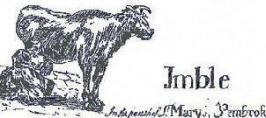From Farming to Shipbuilding
The sleepy farming life all changed when negotiations to make Milford Haven a Royal Dockyard broke down and surveyors landed near Paterchurch Farmhouse in 1814 and declared it a suitable alternative for shipbuilding. From a rural population of no more than a few hundred at most, the town grew rapidly till in the 1901 census there were 11,000 people. Its central industry was shipbuilding - the Royal Dockyard generated the wealth which supported shops, the market, and community and civic life. Townspeople and benefactors provided many of early community buildings - particularly chapels, the Temperance Hall and the Mechanics' Institute. Hotels and public houses were also, naturally, popular venues. The town's development continued in an age when governments encouraged local authorities to provide yet more amenities and services, improving the quality of life. Schools came to offer education for all. The borough council commissioned gas street lighting and ensured the town was provided with water and sewerage systems - public health was an increasingly important responsibility. In its early decades, Pembroke Dock had housed a sometimes primitive community of hardworking "pioneers" but by 1914, its community had developed into a well-provided civic society. In this period, colourful street processions were a memorable feature of town life, often celebrating the opening of schools or public buildings.
Prior to World War One, Pembroke Dock must have been an exciting town to live in with over 200 ships of all sizes already built and a future that must have seemed secure and prosperous. In World War I Pembroke Dock was a substantial garrison town, and the Dockyard remained in production. After the war, though, it became clear the yard was to close. The crushing effect of the losses in the war and the sudden closure of the Dockyard just 8 years later in 1926 brought the boom times crashing to the ground. There were many proud records to look back on - garrisoning almost every regiment in the British Army; a flurry of well-built public buildings and churches and 263 vessels completed including Royal Yachts and some of the most advanced ships of the age. Yet those modern ships were soon superceded by even more advanced ships built in other dockyards and the town slipped into an economic slump, with only a caretaker force left to man what was once a thriving dockyard ringing with the shouts and sounds of industry. The closure dealt the town's economy "the cruellest blow ... ever suffered". Bankruptcies and distress followed. "Look at Pembroke Dock," protested Labour leader Willie Jenkins. "One time prosperous people are glad and delighted to have a food ticket tonight". Some workers moved to other Royal Dockyards, and the town's public buildings now served a depleted community, "a town of unemployed and pensioners".
Smaller private marine industries continued, and then the military provided a lifeline in 1930 when the RAF Flying Boat Base was opened. Despite playing a pivotal role in the defence of the Western approaches to Britain during World War 2, it too became a victim of government cuts and it was closed in 1957.
With its air base, barracks and naval oil depot, Pembroke Dock was a prime target for World War II air raids. Many lives were lost. In 1940, after a bombing attack on a town with no anti-aircraft defences, eleven gigantic oil tanks were consumed by fire. In 1941 a further series of raids left areas of the town in ruins.
Both light and heavy industry provided work after 1945, with factories at Kingswood, and construction and manning of the nearby oil refineries and power station. The Dockyard has been a base for marine services since the 1950s and a small amount of work has since emerged in the old dockyard site with the arrival of the Irish Ferry terminal since 1979.
(Sources: WT 15 July 1926; PT Almanac 1927)
News and Events
Upcoming Meetings
Full Council
Thursday 5th September 2024
6.30pm - Hybrid
Finance Committee
TBC
Personnel Committee
TBC
Planning Committee
TBC
Pembroke Dock Town Council
28 Dimond Street
Pembroke Dock
Pembrokeshire
SA72 6BT
Phone: +44 (0)1646 684410
Or use our contact form.
Office Opening Hours
Monday to Friday
09.00am till 1.00pm

















